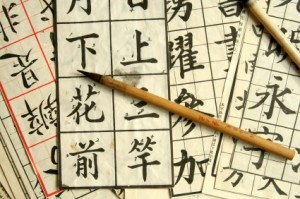I’ve been going to Chinese lessons for the last few weeks. I’m enjoying it but it really it is astonishingly different to any other language I know. After a couple of languages it gets easier as you find out how you learn and you start to recognise patterns and similarities/ common roots. None of the languages I speak is remotely helpful for learning Mandarin however. For the first time in my life I’ve had to sit down and learn vocab lists – and as for remembering the characters – let’s just say it’s a slow process.
astonishingly different to any other language I know. After a couple of languages it gets easier as you find out how you learn and you start to recognise patterns and similarities/ common roots. None of the languages I speak is remotely helpful for learning Mandarin however. For the first time in my life I’ve had to sit down and learn vocab lists – and as for remembering the characters – let’s just say it’s a slow process.
Then there’s the pronunciation. Mandarin has 4/5 tones depending on whether you count a neutral one. The tones completely changes the meaning of words. I’m pretty much tone deaf so this isn’t easy for me. I’m also pretty sure I’ve said some mad things in the past judging by some of the looks I’ve had.
Maybe fortunately given that I’m not great at replicating or hearing the tones, it’s also a language that is very much context based – ie you mostly need a sentence/ context around a word to understand its meaning. That makes it tricky if you don’t possess enough vocabulary to create the sentence to put the word into. I spent a week trying to buy a needle by saying “needle” in Mandarin. This was monumentally ineffective even when I showed people the character. I ended up having a lot more luck with a photograph. Actually this is usually my starting point now. Google images has come to my rescue on many occasions.
One thing that I do really appreciate about Mandarin is its relative simplicity. If you can make yourself understood without some of the words, it’s Ok just to take them out. I have spent ages learning tenses in various languages, but it seems that in Chinese, even these are only used when absolutely necessary. For example, if you say “Last week….” you don’t have to go to the trouble of using the past tense as it is obvious that last week is in the past. Good huh? They don’t have any nonsense like past historic either.
On the subject of verbs, what are the first verbs you learn in most languages, or at least the ones that you use most often? They have to be “to be” and “to have”. Mandarin has those of course but they just aren’t used as much. You don’t say “I have a cold” or “I am ill”, you say “I cold” or “I sick”. Not only does it make things easier but it also explains a lot about how many Chinese people often speak English….Even better, you don’t decline the verbs – so hurrah for that 🙂
The way that words are contstructed makes some sense if you can decipher the logic behind them. Eg a film/ movie is dianying – electric shadow, a mobile phone is a shouji (hand machine) and aeroplane is a fei ji (flying machine). Now I think about it, the last two are remarkably similar to the German Handy and Flugzeug. Maybe I’ve found some similarities after all.
One thing that is definitely very different is the concept of measure words – all nouns come in measures of something. Some are easy – eg drinks come in bei or ping – glasses or bottles (these are beizi or pingzi if not being used as measure words) but then trousers and fish come in measures of tiao – long flat things I think and horses come in measures of pi- which is apparently a large flat thing – which horses emphatically aren’t. I think I should stop trying to make sense of this and just learn them…
Beyond the everyday vocabulary, apparently it gets more complex.I have heard that there can be heated debates among Chinese people about the appropriate measure for certain things (although apparently they have no problem with pi for horses….)
So the good news is that I am learning, it’s going to be a long slog though, full of the dreaded vocab lists. Progress is at a glacial speed but that said, I am definitely understanding more and more.